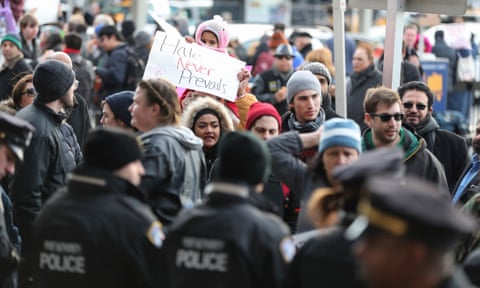On 27 January, Donald Trump issued an executive order. It began his attempt to fulfil a key campaign promise: a “total and complete shutdown of Muslims entering the US”.
On that wintry Friday night, as the nation’s airports descended into chaos, many people stood against the president’s first travel ban. Among them was a small group of young lawyers, working at a series of nonprofits, who one jokingly called Dumbledore’s army. They stand against Trump still.
Their Dumbledore – named for the headmaster of Hogwarts in JK Rowling’s Harry Potter novels – is Mike Wishnie, a soft-spoken Yale Law School professor who leads an immigration-focused clinic staffed by students.
On the night of the first ban, Wishnie was at a Boston Celtics game. The executive order was shocking, an attempt to ban entry to all refugees and people from seven Muslim-majority countries. The professor’s phone began to buzz. The callers were two former students, Justin Cox and Becca Heller.
Cox works for the National Immigration Law Center, out of its office in Atlanta. Heller runs the International Refugee Assistance Project (Irap), a New York-based organization she founded while at school. Irap had several clients who were on flights when Trump issued the ban. One, Hameed Darweesh, an Iraqi national who had worked with the US army, was then held by immigration authorities in New York.
“The first international flights out of JFK were leaving first thing the next morning,” Heller said. “I wanted to make sure our client wasn’t sent back. Justin suggested we go for habeas corpus – seek an order releasing our client. Mike thought we should make it a class action, covering all the people detained in airports across the US and denied entry, nationwide.”

As outrage spread across America, an ambitious plan started to form. Going home from the basketball game in a taxi, Wishnie mobilized about 20 current students to start researching and drafting papers that would, in collaboration with the American Civil Liberties Union, be filed with a duty judge in Brooklyn.
Heller pulled an all-nighter, then arrived at JFK on Saturday. “I hadn’t seen the videos of thousands of people who showed up at airports across the country and were yelling, ‘Let them in’,” she said. “It was mayhem.”
Other former Wishnie students worked at airports in Washington, Chicago and San Francisco. It was the first outing of Dumbledore’s army.
Late that evening, based on the materials and oral submissions by an ACLU lawyer, a Brooklyn judge struck the ban down. It was a moment of triumph. The young lawyers had helped free Darweesh and many others.
“Filing it as a class action, that was so Mike,” said Swapna Reddy, another former Wishnie student who now helps run the Asylum Seeker Advocacy Project, a non-profit that advises women and children. “Even in that tight timeframe, they went the extra distance to go at the executive order’s application to people all over.”
The campaign goes on. All less than a decade into practice, the young lawyers have chosen to use their degrees to work at small-budget non-profits. Instrumental in a succession of interim victories against Trump immigration policies, so many Davids fighting the Goliath that is the US Department of Justice, they have been stretched well beyond what they thought were their limits.
“I’ve pulled more all-nighters than in the rest of my life combined,” Cox said.
Cox and Wishnie are now among lawyers challenging Trump’s decision to end the so-called “Dreamer” program – Barack Obama’s attempt to provide legal cover to approximately 800,000 undocumented migrants brought to the US as children. The case is expected to come before another Brooklyn judge in January.
This month, Irap and Muslim Advocates – employer of another Wishnie alum, Sirine Shebaya – convinced a Maryland court to strike down Trump’s latest travel ban, against nationals of a slightly altered list of Muslim-majority countries as well as North Koreans and some Venezuelan government officials and their families. Cox was one of the lawyers who argued the case. It is expected to be appealed to the supreme court.
Heller has a theory about why the president has made such a push on immigration.
“Trump has repeatedly failed to get his agenda through Congress,” she said. “Every time he fails on this front, he tries to make it up to his base by going after more immigrants and refugees. What we’re seeing is a battle for the soul of the country, an attempt to redefine what it means to be an American.”
Mike Wishnie’s proteges are fighting in that battle. Here are profiles of five of them.
Becca Heller
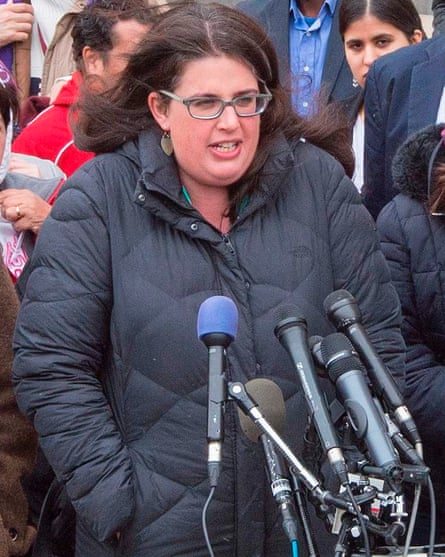
Heller grew up in the San Francisco Bay Area then went east, to Dartmouth for undergrad and to Yale to study law. Between the summer of her first and second years at law school, she worked for a non-governmental organization in Jordan, meeting many Iraqis displaced by the war.
“In many cases, these were people who had risked their lives to help the US forces,” she said. “We decided to set up an organization at Yale, the Iraqi Refugee Assistant Project.” Now headquartered in New York, the non-profit has changed its name to the International Refugee Assistance Project (Irap), reflecting its broadened mandate.
Heller also worked at Wishnie’s clinic on the Danbury 11, a case in which a group of workers were picked up from a day labor site in a nearby Connecticut town by policemen masquerading as contractors. The officers detained the workers, with a view to deporting them.
“I repeatedly had to brief and argue a motion saying none of the plaintiffs should have to turn over anything that would implicate their immigration status in the discovery process,” she said. “Frankly, I found arguing a harrowing experience. I said to Mike, ‘I’m really afraid of oral argument.’
“His response was simply ‘I don’t believe you.’”
Something in the exchange gave her confidence. “There was this sense that he thought his students were capable of impossible things,” she said, “so they delivered that.”
Her organization has been on the frontlines against the administration’s executive orders. “There’s been ongoing fights for immigrants’ rights in America,” she said. “The Obama administration was no friend to undocumented immigrants. But the vitriol is new, is different, with the dialectic coming from the man at the head of the administration calling [some immigrants] rapists, murderers, terrorists.
“The fight over immigrant and refugee rights feels personal, feels existential to me.”
Simon Sandoval-Moshenberg
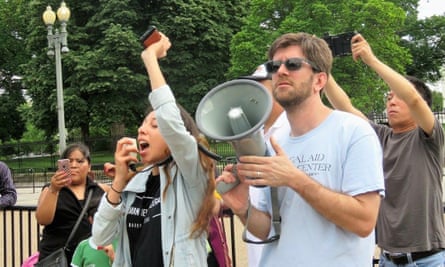
The child of immigration activists, Sandoval-Moshenberg lived in a “town in Virginia [where] there was a big Salvadoran community, people who’d fled the civil war”. After undergrad at Columbia he went to Yale with the idea of qualifying to help people navigate the byzantine US immigration and refugee apparatus.
At law school, he heard about the Danbury 11. Then new to Yale, Wishnie had decided the clinic he was hired to start would take the case on. Not only did the students free most of the arrested laborers but they got a settlement of $650,000 from the city.
Post-law school, Sandoval-Moshenberg landed a job with the Immigration Advocacy Program, part of the Legal Aid Justice Program, working out of his native Virginia. On the evening the first Muslim ban came down, he was sick and stayed home.
“Which, as it turns out,” he said, “was lucky. Someone needed to bang out the suits for the lawyers at the airport.” He worked with another member of the Yale network, Sirine Shebaya, to issue proceedings to help two Yemeni brothers caught by the ban reunite with their father.
His organization is now planning to challenge the way the Trump administration ordered the cancellation of Deferred Action for Childhood Arrivals (Daca). “They said they were stopping renewals for Dreamers on 5 October but before that people had renewal dates in this coming December, January,” he said. “Like with a driver’s license, you don’t start to think about renewing until close to the time.”
Justin Cox
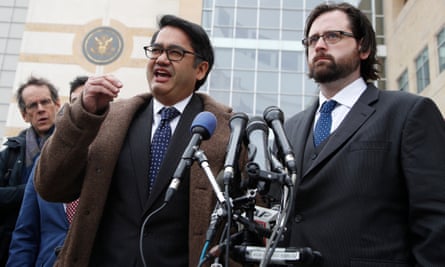
As counsel for the National Immigration Law Center, Cox has litigated against both of the Trump administration’s main thrusts in immigration, the Daca order and the travel bans.
“We think the president has exceeded the statutory authority given to him,” he said. “There’s a statute passed by Congress, the Immigration and Naturalization Act, that he can’t just rewrite.”
Unlike his friend Sandoval-Moshenberg, Cox did not come to law school intending to specialize in immigration. “I grew up in a town in Missouri where everyone was white, everyone was Christian,” he said. “My mom worked two, three jobs to help raise me. In college [in St Louis], waiting tables, I met the busboys, all Mexican, got to know them … learned Spanish, spent a year in Latin America. One small thing leads to the next.”
At Yale, he was outraged when he learned about the sting in Danbury.
“These guys just wanted to work to put food on their family tables,” he said. “The guys at the restaurant would just have finished their day jobs when they came in for their shift. In America, we do this good immigrant-bad immigrant thing, going both ways: Mexicans are both lazy, a drain, and they take all our jobs.”
That said, he says he was heartened by the number of Americans who converged on the airports on the night of the first ban.
“I’ve been doing immigrants’ rights works since law school,” he said. “It’s not often that you have hundreds, thousands of people, particularly white people, chanting ‘Let them in’ on behalf of our clients.”
Sirine Shebaya
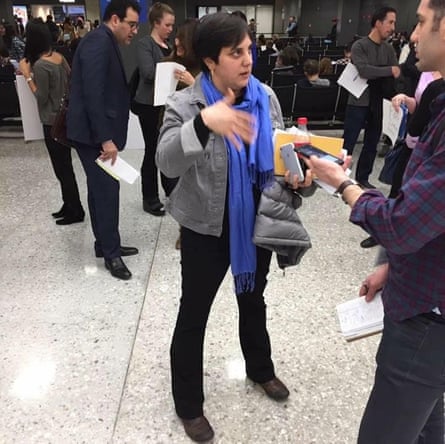
Shebaya helped draft the complaint heard by the Maryland district court in October, on the basis of which it issued a preliminary injunction against the third travel ban.
“We call it the Muslim Ban 3.0,” she said, flatly.
As senior counsel at the Washington DC-based non-profit Muslim Advocates, Shebaya worked to ensure the documents put before the court spoke of the hardships the ban visited on Iranian-Americans.
“Their names have been kept out of it,” she said. “They are afraid there will be retaliation.”
Among the clients mentioned in the materials are an elderly American-resident couple in poor health hoping their son can come from Iran to help in their care, and an American-born woman whose fiance is Iranian. Unless she gives up her homeland, the pair will effectively be kept apart by the ban.
Shebaya grew up in Beirut during the long civil war in the Lebanon, then came to the US to do graduate work in philosophy at Columbia, then law at Yale.
“I didn’t really think that Trump would follow through on his anti-Muslim campaign rhetoric,” she said. “But when I saw the first ban, I couldn’t believe it – even though I had two young kids, one just four months old, we had to go the airport as a family, to Dulles.”
There, with remote backup from Sandoval-Moshenberg, she helped put together the suit that got the two Yemeni brothers into the country.
“Their father was waiting for them in Michigan,” she said, “and they were coerced into signing something that said they gave up their rights to come into the country, and deported.
“On the phone, while his sons were detained, the father asked me if I thought his boys had had anything to eat, to drink. That question, a father wondering about his sons’ wellbeing hit me hard.”
Swapna Reddy
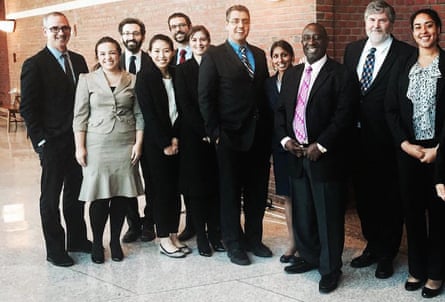
The daughter of Indian immigrants, Reddy grew up in Tennessee and did her undergrad in computer science at Harvard.
“After I graduated I did some quantitative work,” she said, “mostly with non-profits. One project used artificial intelligence to assist teachers in underserved schools. But I wanted to work on problems people identified for themselves.”
So she went to law school. At Yale she worked in Wishnie’s immigration law clinic and, through a grant found by him, got the opportunity to visit the largest US detention center, in Dilley, Texas, near the Mexican border. About 2,400 women and children, mainly from Central America, are interned there while their claims for sanctuary are considered.
“We started representing women in their refugee claims,” Reddy said. “Before we came, almost no one was winning. Everyone we represented won their cases.”
To continue working with women and children claiming refugee status, she and three others co-founded the Asylum Seeker Advocacy Project in 2015. Based in Chicago, she has used her computing savvy, setting up a chatroom for women who have left the Dilley detention center and others.
“They built supportive friendships in there and through the online community often can help each other out,” she said.
She has also helped set up a listserv for volunteers who since January have been visiting O’Hare airport, to provide legal and other aid to inbound travelers.
One of her clients, a Honduran woman – identified only as FH – and her son hit the news in May, when Pennsylvania senator Bob Casey used Twitter to try to convince the Trump administration to prevent her deportation, ultimately without success.
“She claimed she’d seen her cousin killed and had death threats made against her,” Reddy said. “The issue we’re facing is that the bar as to what is a credible fear of persecution has been raised.”
